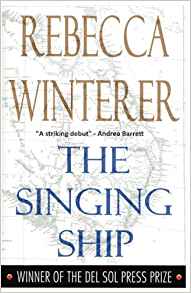Book Review
 Elliptical, lyrical, and captivating, Rebecca Winterer’s debut novel, The Singing Ship, melds the modern with the historical. As Winterer dives into the inner lives of a contemporary family in Australia, we frequently find ourselves taking part in the historical expeditions of Charles Sturt, at first as an escape and later as part of Bernadette Pilgrim’s scholarly pursuits. This novel is a gorgeous illustration of the incomprehensible origin of individual behavior. Why would a young woman lie to her friends about the death of her father? And then cling to that lie, even when he visits her at college—introducing him as her uncle? Why would a man who has brought his wife gifts of buttons every single day of their marriage—a testament of his love and devotion—help her sort and inventory buttons gifted from other men?
Elliptical, lyrical, and captivating, Rebecca Winterer’s debut novel, The Singing Ship, melds the modern with the historical. As Winterer dives into the inner lives of a contemporary family in Australia, we frequently find ourselves taking part in the historical expeditions of Charles Sturt, at first as an escape and later as part of Bernadette Pilgrim’s scholarly pursuits. This novel is a gorgeous illustration of the incomprehensible origin of individual behavior. Why would a young woman lie to her friends about the death of her father? And then cling to that lie, even when he visits her at college—introducing him as her uncle? Why would a man who has brought his wife gifts of buttons every single day of their marriage—a testament of his love and devotion—help her sort and inventory buttons gifted from other men?
On learning of Audrey’s quilt, some men would slip her buttons stolen from their wives’ sewing boxes or pull them off their shirts and coats with bravado or shyness or the first emotions covering the second because some of these men felt more strongly for Audrey than she knew or cared. Occasionally, the men’s wives, not understanding the extent of their connection with Audrey and some who did, would send along their own buttons.
Winterer sprinkles small but important questions throughout this novel. Mysteries, as elusive as Australia’s famed inland sea, crowd the pages and propel us forward on a strange and beautiful journey through the bush. But it’s not simply the mysteries that keep us engaged. Winterer’s oblique and selective description of the insidious nature of dust, the slant of light through eucalyptus trees, and the battle against sweltering heat bring Australia alive on our tongues and in our nostrils. And Bernadette Pilgrim’s frequent and fanciful expeditions with the historical explorer, Sturt, bring an undercurrent of hardship and purpose to the story. Life isn’t easy. Buck up and get to it, mate.
In this story about sisters, about their connection to their parents, and about their parents’ connection to each other, the Pilgrims—a name adopted by Robert for similar reasons as his own daughter’s rejection—exhibit strange but somehow understandable behavior. Robert’s acceptance of his wife’s promiscuity; Bernadette’s precarious grasp on reality, evidenced by her flights into Sturt’s expeditions where she is not simply a historian observing the past, but an actual member of his party; and Jane’s retreat into life as a convent nun where she attempts to communicate with Bernadette by sending her a series of found Last Wills & Testaments, are all recognizable as symptoms of bigger wounds not yet revealed.
Time is set adrift in fluid back-and-forth leaps. Scenes are sensual moments rather than chronological narratives. Events are often relived in memory more than lived in the present. Winterer sums up her own interesting style in a climactic scene where Bernadette comes to terms with the events that have separated her from her family:
Strange how fast the past could return to you and then pass away from you, like certain images and voices were independent of people and time, and that, depending on where you stood, they could fly at and through you.
With deeply insightful prose, Winterer runs a finger over the memories we cannot escape, but she doesn’t linger there. She touches them, then retreats back into a world we believe we can control. Touch and retreat. Touch and retreat. Building in us an urgent need to see it—understand it. Until, finally, it unfolds, naturally, brutally, but also gracefully. And it is every bit as powerful as we had expected.
There is not always logic beneath our actions, but there are assuredly always reasons. The Singing Ship catches us off-balance, even as we expect what is coming:
Bernadette realized that to explore was to salvage, to record a story was to remember one, that an injury and a gift could exist in the same strike, that her choices were hers but also not hers and her thoughts were strangely inseparable from others—dead and living…
In this beautifully written novel, Winterer takes us on an expedition into the Australian bush and the depths of faith. An expedition to the boundaries of family bonds, an expedition to the limits of reimagining oneself, an expedition to the treachery of others, and an expedition to the mysteries of human emotion and behavior.
About the Reviewer
Heather Sharfeddin is the author of five novels set in the Northwest. Her work has earned starred reviews from Kirkus Reviews and Library Journal, and has been honored at the New York and San Francisco Book Festivals. Sharfeddin lives in McMinnville, Oregon, and she holds an MFA in writing from Vermont College of Fine Arts and a PhD in Creative Writing from Bath Spa University (Bath, England).